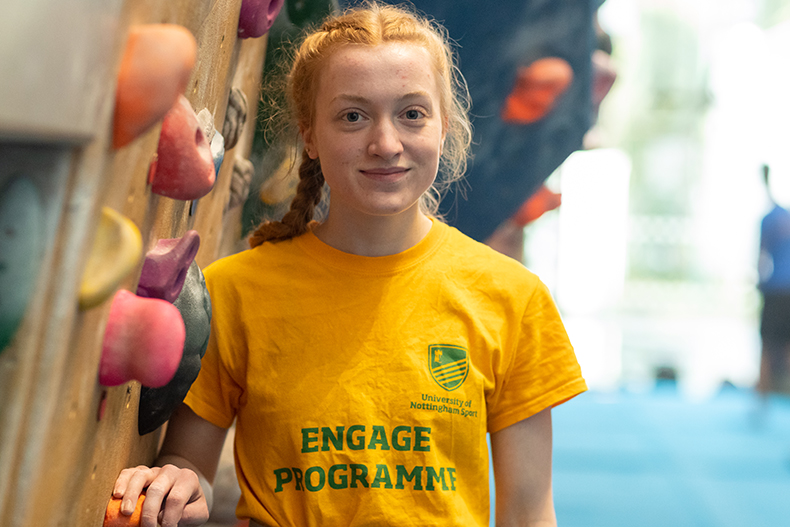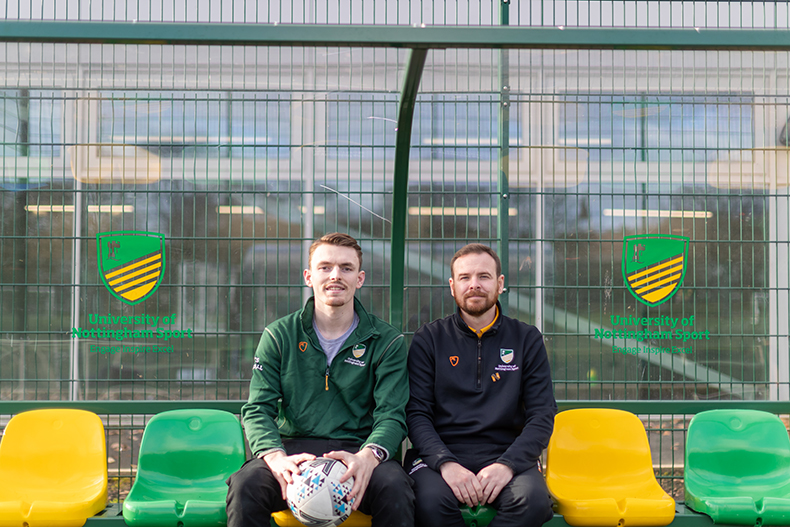Why I participate
From archery to wakeboarding, participating in sport or exercising is key in helping us live happy and healthy lives, both physically and mentally. In the last two years, over 130 of you have donated more than £750,000, helping hundreds of students benefit from these sports and more at all levels.
Here we highlight four sports where your support is taking students to the next level.

Rugby - Ella Wyrwas
Ella Wyrwas is a second-year biology student who has been awarded a scholarship in recognition of her potential on the pitch. Playing rugby from the age of six she has represented England at under-20 level.
“It’s quite daunting really. When I first came I wasn’t aware of the strong history the University has in rugby, with Brian Moore and Chris Wyles, both alumni who are heroes I have looked up to since I was such a young age. Brian came in the other day and I got to talk to him – it’s quite surreal really.
"It just shows how the support the University provides has a purpose and creates elite athletes. The most valuable aspect of the scholarship for me is the additional support and structures which I’m provided with. I tore the two ligaments in my knee in March 2019, which is literally any rugby player’s worst nightmare.
"It resulted in two surgeries within about four months and the minimum time then on the sidelines is 12 months.“The injury occurred at a crucial time in my development as a player because I was on the brink of breaking into the senior national side.
"The scholarship is invaluable because of the support it enables – I have been following a tailored programme with a dedicated strength and conditioning coach who really goes above and beyond. To have a member of staff who is so invested in my welfare is so important.
"Without this I would really be struggling to fulfil my potential and have any chance of being an elite women’s rugby player. The sport is on the up, so the support at this time is crucial.”

Inclusive climbing - Martha Evans
Initially established in 2017, running just a handful of sessions per term, Cascade funding has enabled the University’s Inclusive climbing group to now meet every Sunday during termtime.
Designed for those who are disabled, have a mental health condition or are new to climbing, the club has significantly developed the prowess of around a dozen students thanks to dedicated support and supervision.
The group has also thrived thanks to a helping hand from several volunteers, including Martha Evans, a second-year sport and exercise science student who during the sessions discovered she had a natural talent for paraclimbing, an offshoot of the sport.
“The sessions give people the confidence to try something they wouldn’t otherwise get to do and they helped me personally develop to the stage where I was competing nationally too.”
Last year Martha represented Great Britain at the International Paraclimbing Championships, coming third. “Competing at the World Championships was amazing, it just felt so surreal to actually be there! Now I’m going to train even harder so I can make podium again, and hopefully first place, at Moscow 2021.”
The group isn’t just looking to train potential world beaters but give all students the opportunity to escape the pressures of studying and try something new. “I and a lot of people find that when we’re on the wall climbing, they’re just thinking about the climb and nothing else. It’s just you in the moment.”

Wheelchair basketball - Harry North
“I don’t know what it is about the sport, but it just attracts great, friendly, sociable people who are prepared to try something they wouldn’t normally and so are extra enthusiastic. There’s a great social scene as well!”
Harry North (above, right), a third-year maths student sums up the unique appeal of the University’s Wheelchair Basketball Club, which is increasingly popular thanks to your support.
You might assume that wheelchair basketball is only for students with a disability, but the inclusivity of the club is something which Harry is proud of.
“Once you’re in the chair, disability or not, you’re equal. And it’s just incredibly fun crashing into people in chairs – even though that’s not technically allowed!"
The club has recently benefitted from a £2,500 grant from the Bruce Wake Charitable Trust, enabling the purchase of two sports wheelchairs and provision of specialist coaching.
Integral to the running of the club is University Volunteer of the Year, Martin Austin (above, left), recognised with an MBE in The Queen’s New Year’s Honours list. The commitment of over 250 hours of his time has been instrumental in the development of wheelchair sport at the University.
“It’s not like a football club where you just need some balls, vests and cones - you cannot play this game without the right equipment.
“A decent chair is not cheap as each one is made bespoke for a player and they can’t play to their potential otherwise. We want to give the team the best chance possible to progress in the league. It’s impossible to run this club without support from donors.”

Football - Alex Cozens
Alex Cozens, third-year ancient history student and Vice-President of the Men’s Football Club in one sentence sums up the impression which troubles men’s football at all levels but is fast becoming a thing ofthe past at Nottingham:
“There is still a stereotype among male footballers that all 100 blokes within the club are ‘lads’ who buy into the typical culture but certainly in recent years it doesn’t feel like this is actually the case.”
Alex, alongside Football Development Officer Dan Smith, are developing the programme of activity which is transforming mental health provision for students at all levels.
Thanks to a donation from alumna Linda Almond (Applied Biochemistry/Nutrition, 1980), the two were among the first 20 club welfare officers who attended training from Mental Health First Aid England, the only organisation accredited to provide specific support in this area. Over 150 students and staff across seven sports clubs have received welfare and mental health awareness training.
“Once there’s someone who you know is trained to provide support it becomes a lot easier for a player to open up. And otherwise they just may not do so. We’ve also enable dall the captains to undertake a level of mental health training at a workshop which just gives players the option to talk to someone they’re more comfortable with rather than a welfare officer.
“I would never have expected to become someone who would have a role to play in supporting mental health like this. I think this is also recognition of how the University itself has developed its provision and made more students aware of the support available to them.”
---
You may also be interested in:
Once upon a time in Hollywood
One student's life-changing trip to Los Angeles thanks to an alumnus' internship programme
A positive pint
Brewing up a method of tackling poverty with waste bread and beer
Pay it forward
One mechanical engineering student shares how a trip to Ghana changed his perspective on life